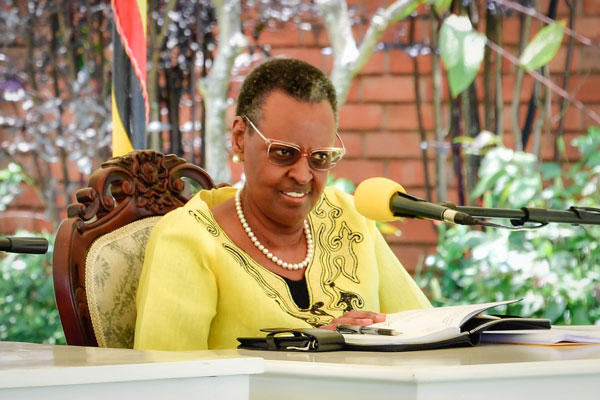
Kampala, Uganda | THE INDEPENDENT | Learners who sat the Uganda Certificate of Education under the old curriculum will be granted a one-off chance to sit for the exam allowing them to proceed to A ‘level. This will also apply to those who registered for URC but failed to sit the exam for one reason or another.
This proposal contained in a document that the Education Ministry presented to Parliament has however generated debate as MPS raised questions with many saying that a one-off chance is not adequate.
The debate in Parliament came after The Ministry of Education presented a document outlining the strategy for transitioning from lower secondary to upper secondary under the new competence-based curriculum.
In 2020, when the new curriculum was introduced, there was no clear plan for students who might not pass the 2023 examination, which serves as the final official assessment under the old curriculum. It did not also outline what would happen to learners who may not have registered or could fail to participate in the examination due to various reasons, such as illness.
Uganda Radio Network in 2022 had raised the matter to the Ministry and the National Curriculum Development Centre-NCDC. Officials then dismissed it as a “minor unforeseen issue,” The matter has become sticky and controversial not only stopping at the UCE but extending to Uganda Advanced Certificate of Education (UACE)
As the final cohort of students under the old curriculum completed their UCE examinations last year, the question gained momentum, with widespread curiosity about what would unfold. The Ministry, however, maintained a tight-lipped stance, offering only a few unofficial communications.
On Wednesday, Dr. Joyce Moriku Kaduccu, the State Minister in Charge of Primary Education present the transition plan to parliament. She UNEB will administer a “one-off” examination to cater to diverse groups of candidates who may have been affected.
She said the exams will be conducted for those who sat for the 2023 UCE but voluntarily wish to retake the examination, perhaps to achieve better grades corresponding with the number of subjects they plan to undertake at the A’ level.
The exams will also include those who registered but failed to sit for the examination and those who missed the registration for the 2023 examination due to various reasons. Another group that the plan addresses consists of adult learners who are studying independently or at any learning facility.
Based on the data at hand, in previous years, an average of 6,000 students have consistently failed to appear for the UCE examinations despite having duly registered for them.
Furthermore, there exists a group of students who do not succeed in their exams and are recommended to retake the senior four level. For example, 15,756 students did not pass the Uganda Certificate of Education (UCE) in 2022, and in the 2020, 18,415 candidates were unsuccessful.
Debating on the matter, John Twesigye, the MP for Bunyabuguiru County, pointed out that during their interactions with UNEB while approving the budget framework paper, UNEB officials mentioned that the examination would be conducted around June and July.
This implies that the board is providing learners with four months to prepare, register, and sit for the examination. And the learners who would be affected have not even received their examination results.
Twesigye asked the Ministry to specify the dates for these examinations and the related processes.
URN has been informed Uganda National Examinations Board already communicated to district education officers instructing them to register locations where these learners will be sitting their examinations.
However, questions have arisen about what will transpire if a learner, for instance, who failed the 2023 examination, encounters an emergency, and misses the one-off examination.
Solomon Silwany, the Member of Parliament for Bukooli Central said the one-off exam being suggested by the ministry was insufficient. He expressed concerns that candidates might encounter issues again. He emphasizes that it should not be a singular opportunity but rather a continuous process.
Amidst the debate, MPS discovered that as the inaugural cohort of the new lower secondary curriculum enters its final year, the Ministry and the Curriculum Development Centre have not completed the A’ Level Competence-Based Curriculum.
The revelation led to more questions as it appears that the education sector is in a real crisis.
Questions are being asked about the fate and what will happen to when the learners complete their O’ level studies. The Minister informed the house that the National Curriculum Development Centre (NCDC) has initiated the review of the A’ level curriculum to guarantee the continuation of enhanced teaching methods.
She said everal preliminary activities have been undertaken in preparation for the review and implementation of the upper secondary competence-based curriculum. Among these activities is the conduct of an assessment study on the current A’ level curriculum to identify its inadequacies.
Kaducu said the ministry is consulting with various stakeholders to gather input and recommendations based on the findings.
“NCDC has developed A Level curriculum framework as part of an outcome-based education reform design which is aligned to the O’Level framework. In addition to documents to guide the implementation, the ministry through NCDC has developed syllabus materials for the proposed 25 subjects to be offered at A’ Level,” the minister added.
According to Kaducu, the Ministry is currently undergoing a quality assurance and approval process for the A’ level curriculum, which will at a later date be presented to Parliament for input.
The Speaker, Thomas Tayebwa expressed his displeasure about how the matter has been handled. He is of the view the review of A-level education has progressed at a slow pace. Tayebwa wondered what would happen to learners in S.3 and S.4 who are required to choose electives A’Level when they don’t have an idea what the structure of A-level will be when a new curriculum finally come out.
He noted that students’ choices are significantly influenced by their aspirations for the next level of education, which remains uncertain due to the lack of information on how A-level will be structured.
The Minister informed the house that current learners in lower secondary, following the new comprehensive-based curriculum (with the pioneer class undergoing a national assessment, the structure of which is yet to be determined this year), She said they will not transition into competence-based upper secondary, as it will not be ready by then. This implies that they will continue their studies under the existing A-level curriculum.
This statement confused members, and the Speaker expressed concern about how learners who have been following the new lower curriculum will integrate into the existing A-level curriculum.
The Members of Parliament seemed to be passionately energized regarding the raised issue, prompting the minister to acknowledge the need for more information. The minister requested to return to the ministry, consult further, and come back next week with comprehensive details regarding the matter of transition.
Jonathan Odur, the Member of Parliament for Erute South criticized the Ministry saying that there was a lack of thorough debate and discussion on the competence-based curriculum when it was passed back in 2019.
He said if stakeholders had been given the opportunity to raise concerns, some of the issues emerging now could have been foreseen and addressed in a timely manner.
*******
URN
 The Independent Uganda: You get the Truth we Pay the Price
The Independent Uganda: You get the Truth we Pay the Price


